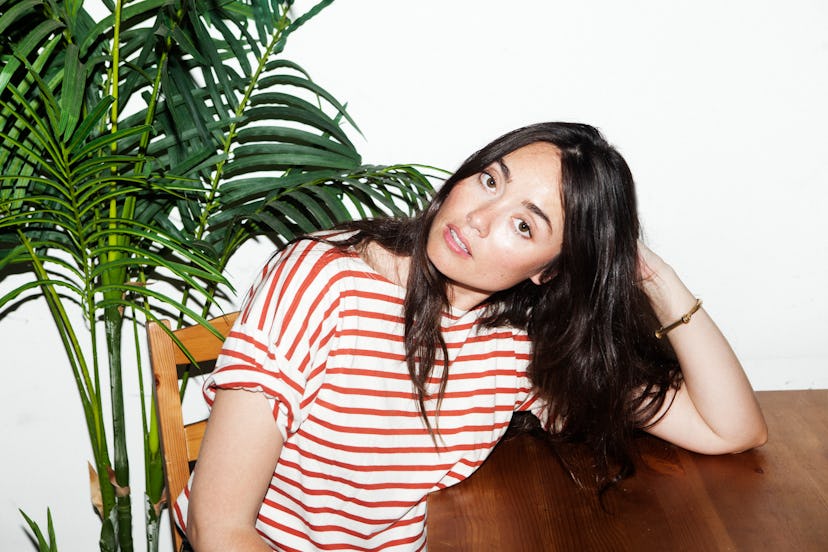Datura Is the Local and Sustainable New York Luxury Brand to Know

Originally from Mallorca, Spain, when Stefania Borras moved to New York City to start her own fashion brand in 2013, she wanted to bring some of the natural, raw, and pure elements of the Mediterranean with her. It is for this reason that her label Datura not only uses luxuriously soft and flowing materials like silk, but also is friendly to the environment in its production.
Today, 100 percent of Datura’s products are made in New York out of natural, luxury fabrics. And even the design is sustainable. “I veer away from trends and try to create timeless and versatile clothes that can be worn in many different ways and for different occasions,” said Borras. “This reduces the need for a huge wardrobe!”
Women in New York are quickly catching on to what the brand stands for. Each month on the Datura Instagram account, they feature an influential community member—a recent one being the artist Camilla Engstrom. But Borras hopes to branch out to a more global audience in the near future, which seems possible given her appreciation for the earth as a whole.
What’s the story behind the name Datura?
Datura is a flower also called the ‘moon flower’ or ‘devil’s trumpet.’ It comes out at night and has a very intense, sweet, and bewitching smell. In the past, it was used as a tea and witches thought they could fly after drinking it. It’s a very hallucinogenic drug and has been used by many different cultures over the years. I liked the idea of something being so beautiful and attractive but dangerous at the same time—like nature, beauty, and life. It commands respect.
How does the Datura style and aesthetic reflect your background?
I was brought up in the Mediterranean in Mallorca and the nature there is beautiful, raw, and pure. The water is crystal clear, the sand is white and soft, and the the rocks and mountainous landscape are so beautifully dramatic. That environment is how I remember my childhood—very pure, simple, safe and free. When I moved to live in the city, I missed that feeling and wanted to bring those elements into it in some way.
How would you describe the Datura style?
The color palette of my pieces, the movement of the fabrics, the feel, softness, flow and fit are very natural and give the women that wear them a sense of freedom that I think is very sexy.
How is your brand’s manifesto is rooted in environmentalism?
Using natural fabrics is very important to me. I’ve never liked synthetic materials and I think that natural materials just feel more luxurious anyway. Making small batches means I never overstock. And because I manufacture everything here in New York the carbon footprint is significantly reduced. When it comes to the pieces themselves, I veer away from trends and try to create timeless and versatile clothes that can be worn in many different ways and for different occasions. This reduces the need for a huge wardrobe!
You feature different women on your Instagram account. What connects them to each other? How would you describe the Datura community?
Their empowerment, their inspiration to others, their work, and their personality connects them. Datura women are beautiful for all of the above and have their own individual style and personality.
Personal fashion icons:
Frida Kahlo, Georgia O’Keeffe, and Coco Chanel.
Fashion pet peeve:
Almost everything that comes up when you Google “Coachella.”
Something you would never wear:
Anything that’s trying too hard! I just can’t deal with accessories that have no purpose. They usually make you look, walk, and feel uncomfortable.
Best recent discovery:
Panteha Abareshi
Most prized possession in your closet:
Mostly vintage dresses. I have a few white long embroidered ones that I love wearing in the summer. Also a hand-made Italian leather clutch that is sculpted into pleated flowers. It’s hard to describe, but it’s very special and from the 80s.
Where you hope to see your brand in the next few years:
I want to open up offline locations in different cities and destinations and carry on with the Member Styles in different and interesting corners of the world.
Related: The Fashion Industry’s Effect On the Environment, And the Brands That Are Taking Charge
21 Chic, Sustainable Items to Shop This Earth Day
St. Roche lace up canvas and linen dress, $225, st-roche.com
Khokho mini jabs over basket bag in plum, handcrafted from sustainably harvested Lutindzi grass with eco-certified dyes, $495, maison-de-mode.com
Svilu printed tank top, $245, svilu.com
Maiyet biodegradable Shades sunglasses in ebony, $195.00, maiyet.com
Cult yoga study Sky Ting teamed up with Everybody for an Earth Day 100% recycled cotton tee, with proceeds going to the World Wildlife Fund, $40, skytingyoga.com
Edun denim slit pant, $390, edun.com
Brother Vellies burkina bow slides, $285, netaporter.com
Mercedes Salazar Tuti Fruti clutch, $220, revolve.com
John Hardy celebrates the 10th year of its bamboo collection, where proceeds from the purchase of jewelry in the collection goes to the planting of seedlings to offset carbon emissions. The brand is planting its one millionth bamboo tree this year. John Hardy link bracelet with diamonds, $6,600, johnhardy.com.
Beautiful Soul London floral printed dress, $420, maison-de-mode.com
kowtow knit, made from 100% certified organic cotton, $239, kowtowclothing.com
Mola Sasa Indigo clutch, $330, modaoperandi.com
Vitamin A launched a capsule collection of eco-friendly swim created from recycled bottles. Vitamin A one-piece swim, $180, Everythingbutwater.com
Proud Mary woven raffia d’Orsay shoes, $178, proudmary.org
H&M Conscious Exclusive jacquard weave jacket, $399, hm.com
RE/DONE straight skinny, $305, shopredone.com
Eddie Borgo linen pochette, $890, eddieborgo.com
Alabama Chanin eco-friendly ribbed crew-neck shirt, $118, alabamachanin.com
Melissa Joy Manning Lone Mountain turquoise five drop earring $1,590, melissajoymanning.com
Reformation red silk maxi dress, $300, netaporter.com
Graf Lantz eco-friendly canvas and vegetable-tanned leather bag, $298, graflantz.com